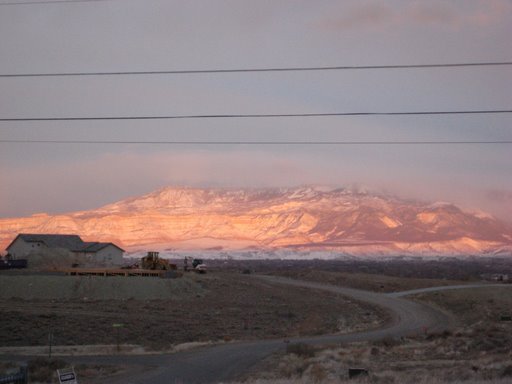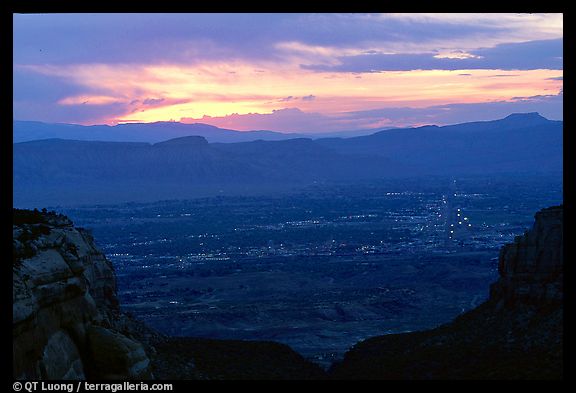Thursday, September 29, 2016
Colorado gets massive return on investment from energy research 'collaboratory,' report finds
The Colorado Energy Research Collaboratory — which includes three of the state’s universities and the National Renewable Energy Laboratory in Golden — has drawn $96.6 million in outside investment over the last eight years and had an economic impact of $194 million, according to a new report.
The Collaboratory includes Colorado State University, Colorado School of Mines, University of Colorado Boulder and NREL, part of the U.S. Department of Energy’s national laboratory system.
Researchers have focused on making fuels from cellulosic biomass; fuels from algae; the development of renewable carbon fiber materials; high-efficiency solar power panels; and reducing of methane emissions from natural gas and other sources.
The consortium was started when former Gov. Bill Owens signed into law a measure to fund the Collaboratory, up to $2 million a year for three years, beginning in fiscal 2007.
The Collaboratory received almost $8 million.
It focuses on clean energy research partnership and the leveraging science and engineering capabilities of each institution in the organization.
Together with public agencies, private enterprises and nonprofit organizations, members of the group work toward renewable energy solutions and technologies; support economic growth for renewable industries; and train and educate the next generation of energy researchers and workers.
According to the analysis conducted by Brian Lewandowski, an economist at CU Boulder’s Leeds School of Business, the initial state investment of $7.96 million led to another $96.6 million from industry, the Department of Energy (DOE), the National Science Foundation and other sources in support of Collaboratory research between 2008-2015.
The total impact constitutes a return of 24:1 on the state’s original $7.96 million investment.
The report concluded that the state’s investment in setting up the Collaboratory has been “extraordinarily productive: economically, scientifically and technologically.”
Friday, September 23, 2016
First Colorado C-PACE Project Receives Financing
The New Energy Improvement District (NEID) has announced financing for Colorado’s first commercial property assessed clean energy (C-PACE) project. NEID, with support from the Colorado Energy Office, oversees the development of Colorado C-PACE projects. The Boulder County project is a 42,000 square-foot commercial and industrial facility owned by Urban Green Development. The facility will undergo energy improvement measures totaling approximately $320,000, with a loan from Citywide Banks.
According to NEID, the total projected savings of 188,082 kWh represents a 15% reduction in annual building operating costs. Energy upgrades will include a 100 kW rooftop solar PV array capable of producing 14,000 kWh each year. New interior and exterior LED lighting will save an additional 48,082 kWh per year.
“The availability of Colorado C-PACE financing was the catalyst that drove our decision to make these important building improvements,” explained Scott Kiere, CEO of Urban Green Development. “This investment will increase the asset value, lower energy costs and reduce greenhouse-gas emissions.”
NEID says Boulder and Adams County were the first two counties to opt into the Colorado C-PACE program. Broomfield, Eagle, Jefferson and Arapahoe counties also have joined the program. Several additional counties are expected to become involved in Colorado C-PACE by the end of the year.
Friday, September 9, 2016
Solar developer protests community solar size in Colorado Xcel settlement
Denver-based SunShare, a developer of community solar gardens, has filed a formal protest challenging a June settlement between Xcel Energy and a wide range of parties that limited new solar fees and pushed for the development of more shared resources, the Denver Post reports.
While the settlement allowed private developers to construct solar gardens up to 2 MW in capacity, SunShare says the Colorado Public Utilities Commission should raise that to 50 MW—the size Xcel Energy is allowed to own.
More than two dozen parties have signed onto the settlement, including major Colorado solar interests, but support is not unanimous. Only eight of the parties fully backed the settlement, which must now be reviewed by the PUC.
A solar settlement in Colorado has been hailed as a "monumental achievement" by some advocates, but not everyone agrees. The Denver Post reports SunShare has filed a formal challenge to the settlement, arguing it gives Xcel Energy inherent advantages of scale in the development of community renewables.
Specific to SunShare's complaint, the settlement modifies Xcel's 2017 Renewable Energy Plan to add 225 MW of solar to the utility's Solar*Connect program, which will be renamed Renewable*Connect, as well as development of 105 MW of community solar gardens. Under Colorado rules, existing shared solar programs can be no larger than 2 MW and can only be marketed locally. The R*C 50 MW project would be marketed statewide.
By allowing Xcel to develop a community solar facilities 50 MW in size, SunShare argues that Xcel can generate renewable power 40% cheaper while also being able to access the grid at lower cost. The company wants regulators to allow privately-developed community solar garden at the same size as the utility.
The compromise would also avoid new grid fees, prevent cuts in payments to solar owners, and institute time-of-use rates.
Sunday, September 4, 2016
Boulder Commits to 100% Clean Energy
Boulder, Colorado Mayor Suzanne Jones announced Wednesday that the city would commit to being powered by 100 percent renewable electricity by 2030. Boulder now represents the 17th city in the U.S. to commit to be powered by clean, renewable energy like wind and solar, and is the second city in Colorado to make a 100 percent clean energy commitment along with Aspen.
Boulder Mayor Suzanne Jones was joined by City of Denver's Thomas Herrod who announced that Denver would also undertake plans to examine how to move Denver to 100 percent clean energy.
The announcements were made Wednesday at an event hosted by Sierra Club Rocky Mountain Chapter, Environment Colorado, Google Project Sunroof and the Climate Reality Project where more than 30 groups and organizations came together to urge cities in Colorado to commit to 100 percent clean energy like wind and solar. The event was part of the growing Ready for 100 campaign, which is working in communities across the country to get cities to commit to transition to 100 percent clean energy by 2030.
"Boulder is committed to achieving 100 percent renewable electricity by 2030, as part of our strategy to achieve 80 percent greenhouse gas emission reductions by 2050. Climate change is the issue of our time, threatening to fundamentally change the way we live our lives. We are already experiencing increasingly intense and frequent wildfires, declining snow packs, droughts and more extreme weather events. Yet, it is increasingly clear that Congress is not going to address climate change; cities like Boulder need to take the lead. We can act as a model for cities across Colorado to craft a sustainable future by shifting our energy model from the dirty fossil fuels of the past to clean, renewable energy," said Suzanne Jones, mayor of Boulder.
"A world powered by 100 percent renewable electricity is getting closer and closer every day. In fact, leading cities across the U.S.—including Salt Lake City and as of today, Boulder, Colorado—are making widespread renewable energy a bold new reality," Ken Berlin, CEO and president of the Climate Reality Project, said.
" Local commitments to a renewable energy economy play a critical role in ensuring the U.S. meets the emissions targets created in Paris last year to address climate change. Just as important, they help create a healthy environment where citizens and businesses alike can thrive, as Salt Lake City and Boulder have proven. Like these outstanding communities, The Climate Reality Project's 100% Committed campaign is dedicated to building a brighter, cleaner and more prosperous future."
With Boulder's historic announcement, seventeen cities, including major cities like San Diego and Salt Lake City, have announced commitments to 100 percent clean energy and five cities in the U.S. have already achieved 100 percent clean energy and are powered today with entirely renewable sources. Boulder's pledge to 100 percent clean energy also includes a commitment to derive energy from local renewable energy resources. The Sierra Club and partners are currently campaigning in Denver, Boulder, Fort Collins and Pueblo to urge leaders to commit to powering local communities with 100 percent clean energy.
"Denver recognizes that our goal of 80 percent reduction in GHG emissions by 2050 will require big shifts in how we power our buildings, homes and transportation sector," Thomas Herrod, Climate & GHG Program administrator of the City and County of Denver, said.
"We are committed to exploring efforts like 100 percent renewable electricity as part of our 80x50 process and look forward to having our partners here today help us take on this challenge, immediately initiating that work with a draft of results by mid-2017."
Colorado has long been a leader on the advancement of clean, renewable energy like wind and solar. More than 300 solar companies currently employ almost 5,000 people in Colorado—nearly twice as many people as the coal mining industry. Prices for solar energy have fallen by 80 percent in recent years. In 2012, private investment for installing solar on Colorado homes and businesses totaled $187 million. Earlier this month, Xcel Energy entered into a landmark settlement with various clean energy and environmental advocacy groups that will provide Colorado consumers with greater energy choice and access to renewable energy like rooftop solar.
"The Colorado Sierra Club's Ready for 100 campaign is working to assure a just and equitable transition to a clean energy future city-by-city and town-by-town across the state," Jim Alexee, director of Sierra Club Rocky Mountain Chapter, said.
"The cities of Denver, Boulder, Fort Collins and Aspen have all made bold progress and commitments towards that goal. It's critical that we come together in our hometowns as individuals, businesses and community leaders, to assure that this transition happens as quickly and equitably as possible,"
Thursday, September 1, 2016
Work Program Trains Unemployed Oil And Gas Workers in Solar Technology
The coal industry has been painted with a bleak brush in recent years. Production has plummeted. Plants have closed. Jobs have been lost. And while mining communities grapple with neighbors moving away, increasingly empty schools and fewer tax dollars, a separate industry is blooming: renewable energy. National rhetoric pits the two energy producers against each other. But in Delta County, one organization is targeting unemployed coal miners in the hope of transitioning them into the solar industry - and leaving politics out of the conversation. "We try to steer clear from that in our classes. We try not to get too political," said Chris Turek, spokesman for Solar Energy International. "We all can agree that the technology works and it's getting less and less expensive every year." The Colorado Department of Labor and Employment in April gave the Paonia-based solar organization a $401,000 matching grant as part of the WORK Act, legislation passed in May 2015 that aims to fill skills gaps in Colorado industries. SEI used the money to start Solar Ready Colorado, an initiative to attract and train not only unemployed miners but also veterans and workers furloughed from the oil and gas industry and other trades.
Subscribe to:
Posts (Atom)




